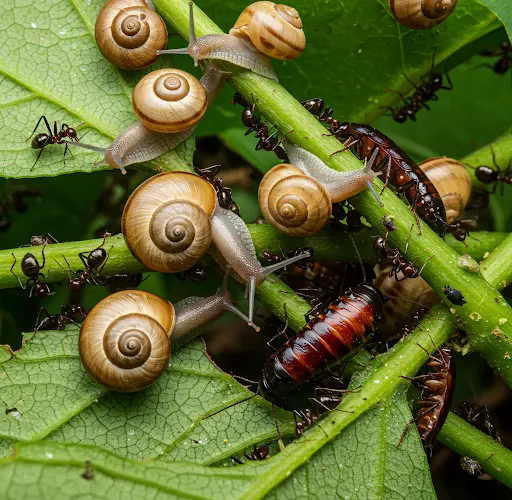5 Natural and Effective Ways to Repel Pests from Your Home and Garden
If you’re tired of dealing with unwanted visitors like insects, mice, and snails in your home or garden—but want to avoid the use of harmful chemicals—you’re not alone. Many people are turning to safe, natural, and environmentally friendly alternatives for pest control. Fortunately, nature offers powerful solutions that can help keep your living spaces pest-free while protecting the health of your family, pets, and the planet.
Below are five simple and natural methods that are effective in repelling common household and garden pests.
1. Herbs and Spices as Natural Repellents
Many herbs and spices contain natural oils and scents that are unpleasant to insects and rodents. Incorporating these into your home or garden not only adds a pleasant aroma but also serves as a natural pest barrier.
-
Lavender: Known for its calming scent, lavender is also a powerful repellent against moths, mosquitoes, and fleas. Plant lavender around your home or place dried lavender flowers in sachets inside closets, drawers, and cabinets.
-
Basil and Mint: These herbs repel mosquitoes and flies. Potted basil or mint near doorways and windows creates a natural barrier, deterring insects from entering.
-
Cinnamon and Black Pepper: These pantry staples are particularly effective against ants. Sprinkle powdered cinnamon or pepper along windowsills, baseboards, and anywhere ants may be entering the home.
2. Vinegar and Lemon Spray
A natural spray made from vinegar and lemon is a simple yet potent solution for insect problems. The strong acidity and scent of both ingredients make the environment inhospitable for many types of bugs.
How to make it:
-
Mix 200 ml of vinegar with the juice of one lemon.
-
Add 300 ml of water.
-
Pour the mixture into a spray bottle.
Use this solution to spray kitchen counters, doorways, window frames, and other problem areas. It not only repels insects such as flies and ants but also acts as a natural room freshener thanks to its citrusy scent.
3. Citrus Peels for Outdoor Protection
Citrus peels are more than just compost-friendly waste—they’re powerful natural deterrents for rodents, stray cats, and some garden pests. The strong scent of citrus is overwhelming to many animals and insects.
-
Scatter orange, lemon, or grapefruit peels around your garden beds, near doors, or in the corners of your patio.
-
The peels gradually break down, adding organic nutrients to the soil while keeping pests at bay.
This method is especially useful for discouraging neighborhood cats from digging in your garden or for deterring rodents from approaching the home.
4. Wood Ash and Coffee Grounds
Both wood ash and coffee grounds are natural byproducts that can be reused effectively in the garden as protective barriers against pests.
-
Wood Ash: Create a circle of wood ash around the base of vulnerable plants. The texture is abrasive to soft-bodied pests like slugs and snails, and they avoid crossing it.
-
Coffee Grounds: The caffeine in used coffee grounds is toxic to many insects, and the coarse texture deters ants and cockroaches. Sprinkle the grounds around garden beds or along windows and doorways to form a pest-repelling barrier.
Not only are these methods effective, but they’re also a great way to reduce kitchen waste and enrich your garden soil in the process.
5. Essential Oils for Indoor Protection
Essential oils are a popular natural remedy for indoor pest problems. They are safe for humans and pets when used properly and offer aromatic benefits in addition to pest control.
-
Lavender and Eucalyptus Oils: Place a few drops on cotton balls and tuck them into drawers, closets, or under pillows. These scents repel moths, mites, and fleas while creating a relaxing environment.
-
Tea Tree and Peppermint Oils: Mix 10 drops of either oil with 300 ml of water in a spray bottle. Use this mixture on kitchen surfaces, baseboards, and window frames to repel mosquitoes and ants.
-
Lemongrass Oil: A natural enemy of flies and mosquitoes. Dab some on window sills, doorframes, or use it in an aromatherapy diffuser to spread the scent throughout your home.
Final Thoughts
Creating a pest-free environment doesn’t have to involve harsh chemicals or costly treatments. These natural methods are simple, cost-effective, and safe for people, pets, and the environment. From herbs and spices to essential oils and food waste, nature provides everything you need to keep pests at bay.
Incorporating these remedies into your routine not only helps control pests but also brings added benefits like improved soil, better-smelling spaces, and a healthier home ecosystem.
If you’re looking for safe and sustainable pest solutions, give these techniques a try and enjoy a more peaceful, chemical-free home and garden.



